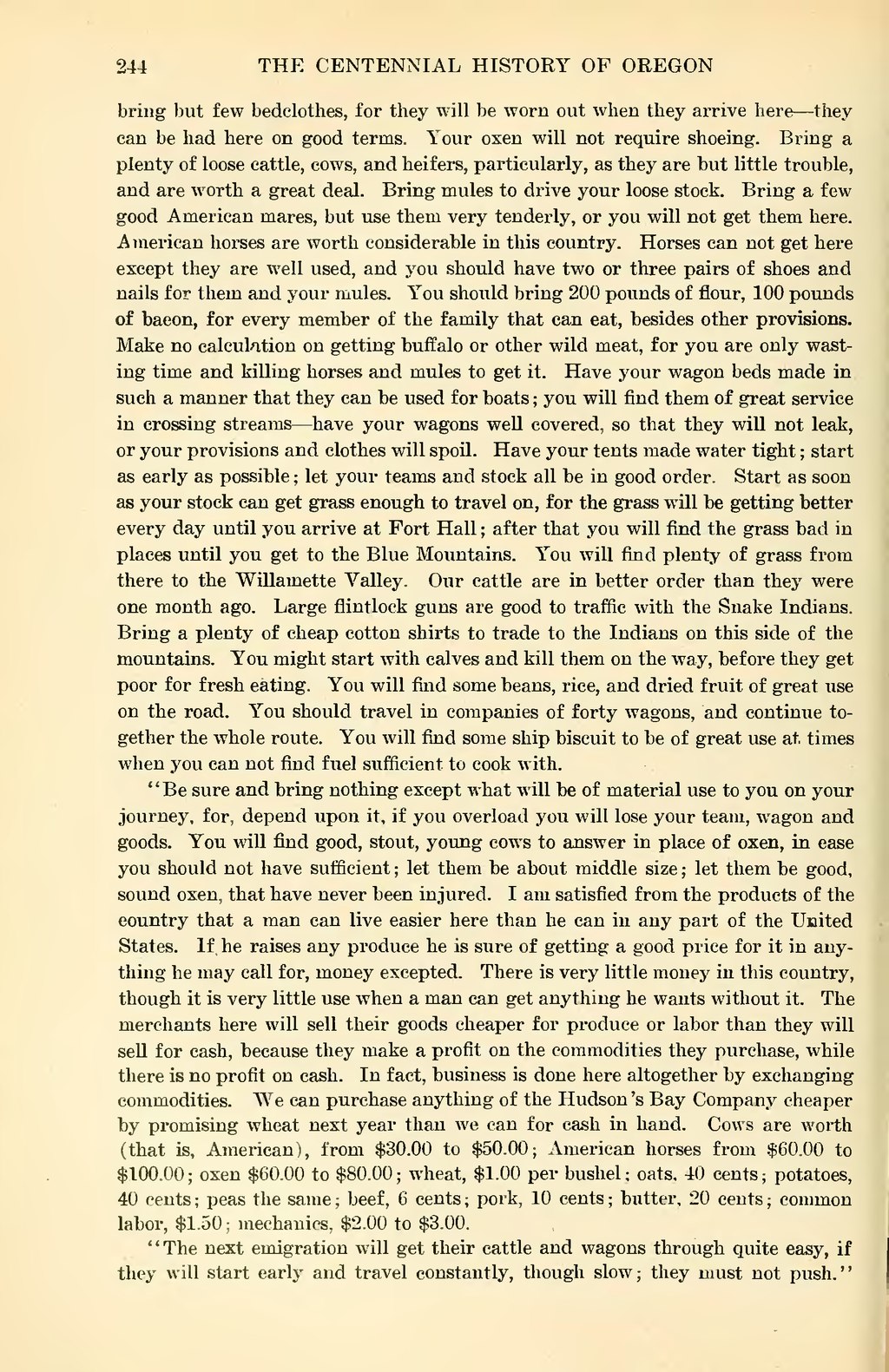bring but few bedclothes, for they will be worn out when they arrive here — they
can be had here on good terms. Your oxen will not require shoeing. Bring a
plenty of loose cattle, cows, and heifers, particularly, as they are but little trouble,
and are worth a great deal. Bring mules to drive your loose stock. Bring a few
good American mares, but use them very tenderly, or you will not get them here.
American horses are worth considerable in this country. Horses can not get here
except they are well used, and you should have two or three pairs of shoes and
nails for them and your mules. You should bring 200 pounds of flour, 100 pounds
of bacon, for every member of the family that can eat, besides other provisions.
Make no calculntion on getting buffalo or other wild meat, for you are only wast-
ing time and killing horses and mules to get it. Have your wagon beds made in
such a manner that they can be used for boats ; you will find them of great service
in crossing streams — have your wagons well covered, so that they will not leak,
or your provisions and clothes will spoil. Have your tents made water tight ; start
as early as possible ; let your teams and stock all be in good order. Start as soon
as your stock can get grass enough to travel on, for the grass will be getting better
every day until you arrive at Port Hall ; after that you will find the grass bad in
places until you get to the Blue Mountains. You will find plenty of grass from
there to the Willamette Valley. Our cattle are in better order than they were
one month ago. Large flintlock guns are good to traffic with the Snake Indians.
Bring a plenty of cheap cotton shirts to trade to the Indians on this side of the
mountains. You might start with calves and kill them on the way, before they get
poor for fresh eating. You will find some beans, rice, and dried fruit of great use
on the road. You should travel in companies of forty wagons, and continue to-
gether the whole route. You will find some ship biscuit to be of great use at times
when you can not find fuel sufficient to cook with.
' ' Be sure and bring nothing except what will be of material use to you on your journey, for, depend upon it, if you overload you will lose your team, wagon and goods. You will find good, stout, young cows to answer in place of oxen, in case you should not have sufficient ; let them be about middle size ; let them be good, sound oxen, that have never been injured. I am satisfied from the products of the country that a man can live easier here than he can in any part of the United States. If he raises any produce he is sure of getting a good price for it in any- thing he may call for, money excepted. There is very little money in this country, though it is very little use when a man can get anything he wants without it. The merchants here will sell their goods cheaper for produce or labor than they will sell for cash, because they make a profit on the commodities they purchase, while there is no profit on cash. In fact, business is done here altogether by exchanging commodities. We can purchase anything of the Hudson 's Bay Company cheaper by promising wheat next year than we can for cash in hand. Cows are worth (that is, American), from $30.00 to $50.00; American horses from $60.00 to $100.00; oxen $60.00 to $80.00; wheat, $1.00 per bushel; oats, 40 cents; potatoes, 40 cents ; peas the same ; beef, 6 cents ; pork, 10 cents ; butter, 20 cents ; common labor, $1.50; mechanics, $2.00 to $3.00.
' ' The next emigration will get their cattle and wagons through quite easy, if they will start early and travel constantly, though slow; they must not push."
I
